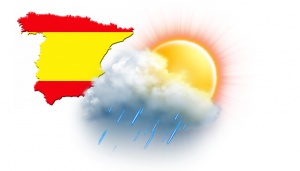Difference between revisions of "Language/Spanish/Vocabulary/Weather"
< Language | Spanish | Vocabulary
Jump to navigation
Jump to search
(→Verbs) |
|||
| Line 19: | Line 19: | ||
==Verbs== | ==Verbs== | ||
*To rain: llover. | *To rain: llover. | ||
*To hail: granizar | |||
*To snow: nevar. | *To snow: nevar. | ||
*To drizzle: lloviznar. | *To drizzle: lloviznar. | ||
| Line 28: | Line 29: | ||
*Me gustaría beber chocolate caliente, hace mucho '''frío''' (''I'd like to drink hot chocolate, the weather is very cold.'') | *Me gustaría beber chocolate caliente, hace mucho '''frío''' (''I'd like to drink hot chocolate, the weather is very cold.'') | ||
*Vámonos, está '''nublado''' y parece que va a llover (''Let's go, it's cloudy and it looks like it's going to rain.'') | *Vámonos, está '''nublado''' y parece que va a llover (''Let's go, it's cloudy and it looks like it's going to rain.'') | ||
*Los granizos que cayeron, fueron los más grandes que haya visto. (The hailstones that fell were the largest I´ve ever seen). | |||
Revision as of 17:30, 18 November 2021
Here are some of the most common words used in Spanish to refer to the weather:
Words
- Sunny day: día soleado.
- Rainy day: día lluvioso.
- Cloudy day: día nublado.
- Humid day: día húmedo.
- Clear day: día despejado.
- Snowy day: día nevado.
- Hot day: día caluroso.
- Cold day: día frío.
- Foggy day: día con niebla.
- Cool day: día fresco.
- Windy day: día ventoso.
- Wet day: día húmedo.
Verbs
- To rain: llover.
- To hail: granizar
- To snow: nevar.
- To drizzle: lloviznar.
- To dawn: amanecer.
- To become night: anochecer.
Examples
- Hoy está soleado (It's sunny today.)
- Me gustaría beber chocolate caliente, hace mucho frío (I'd like to drink hot chocolate, the weather is very cold.)
- Vámonos, está nublado y parece que va a llover (Let's go, it's cloudy and it looks like it's going to rain.)
- Los granizos que cayeron, fueron los más grandes que haya visto. (The hailstones that fell were the largest I´ve ever seen).
